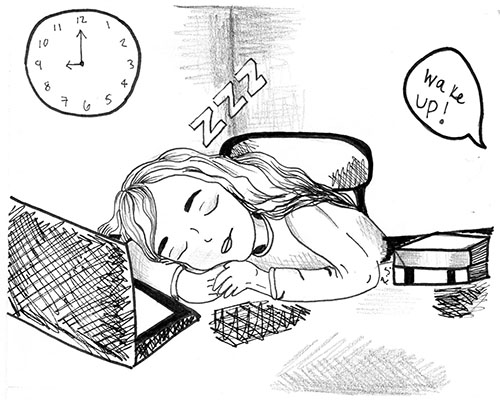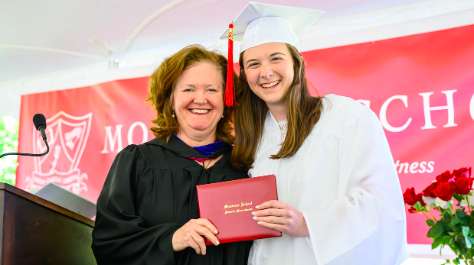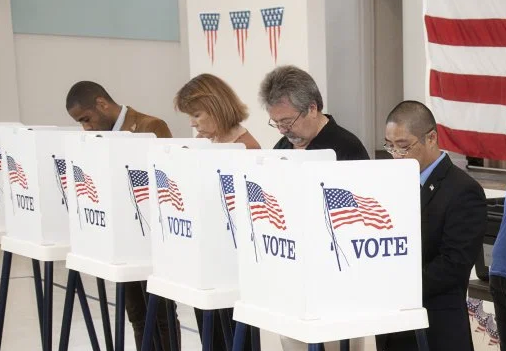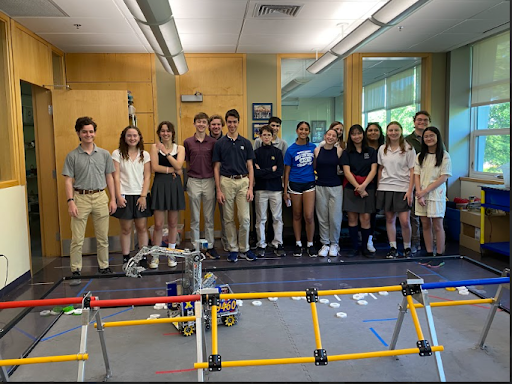Sleep vs Homework: The Battle Continues
If you went to Associate Director of Montrose’s LifeCompass Institute Mrs. Kris’s workshop last Wednesday on “The Brain Boosting Power of Sleep and Exercise,” you heard Mrs. Kris share this quote which she coined: “Sleep and studying are not an either-or proposition. Without sleep, studying is simply less effective. Put simply, sleep is a study strategy.” Mrs. Kris shared research that proves that sleep is as vital to our ability to perform in school as studying…and that without sleep, all that studying might not stick in our brains.
But if you review what times you sleep, you may notice that your sleep schedule is way out of whack. At least, you would if you are like 88.8% of the Montrose students who responded to a recent survey on sleep. Only 21.2% of the survey respondents said they have a fixed time when they go to bed and wake up. The remaining students either sleep at times that are “all over the place,” are fixed when they go to bed but not when they wake up, or are fixed when they wake up but not when they go to bed.
When it comes to the actual exhaustion level of Montrose students, a student survey reveals that we’re not doing too well either. On a scale of 1-5, with 1 representing generally not feeling well-rested to 5 marking general satisfaction with energy level, survey responses formed a bell curve peaking at a 2. That means that 26.9% gave a 1, 30.8% gave a 2, 21.3% gave a 3, 13.5% gave a 4, and 7.7% responded 5. Caveat: mostly upper schoolers respond to the survey. But even if we’re mostly looking at the upper school, it’s not optimal that so much of our upper school is chronically tired.
Why is it that our sleep schedules are so messed up? “It depends on how much homework I get and how focused I am,” said Ana Fernandez ’22. “If I don’t feel like I’m productive enough, I’ll fall asleep and wake up early enough to finish it.” She added: “I feel like I should [get] eight to nine and it happens occasionally but definitely not enough.” “I should be getting eight but I usually get around five or six,” said Mariah Hanifin ‘26 about the number of hours she sleeps, and that it is “definitely homework” that keeps her up. Grace Gulbankian ‘21 said: “It is usually homework that keeps me up late.”
On the other hand, the mixed-up sleep schedules of Montrose students may not be entirely due to the number of hours we spend on homework and other responsibilities. Elyza Tuan ‘23 responded: “Sometimes sheer anticipation for a test can keep me up.” Issie Russo ‘21 reflected: “Stress can make it difficult to sleep even when you feel tired.”
So is it sheer volume of work or stress that keeps us up at night? Tori Morris ‘23 said she usually gets about 4-6 hours of sleep because of “homework and the stress of trying every day to try and devote all of my focus to school.” Tess Kurina ‘26 said: “If I don’t finish [homework], then I am stressed out and don’t get enough sleep.”
Scarlett Testa ‘23 said: “Getting behind on one assignment leads to a late night, which leads to drowsiness, less sleep, and less concentration. Which in turn leads to more late assignments and late nights….It’s a constant struggle between sleep and homework — and almost always, homework wins out [over] fear.”
It’s definitely a combination of factors that limits the quality of students’ sleep. Many students responded that they fall asleep while doing homework, wake up in the middle of the night, stumble into bed, and then wake up early for school. Uninterrupted sleep may cause much of the “off” feeling that we’re experiencing, along with the pitiful amount of time we’re actually snoozing. Theresa Marcucci ‘23 reflected: “I always thought sleep would be something that, if placed high enough in priorities, would be pretty simple to get plenty of. But I find that there just isn’t enough time during 24 hours to get everything that needs to get done done, and sleep a full 8 hours.”
We all know how precious sleep is, both from the research and from our low energy level and inability to focus after a night spent more on algebra than on our pillows. But as Mrs. Kris said, “Sleep is a study strategy.” If you’re trying to succeed in school, extracurriculars, or any work, sleep might be the key. And yet the responses of 52 Montrose students — that’s a fourth of our student body — point to the sleep deprivation and unhealthy stress levels that limit the sleep of so many of us — the sleep which would cure these problems!
If you’re looking for time management strategies, definitely check out the recordings of Mrs. Kris’s workshops “Focus Power! Tips for Getting Started and Staying Motivated (Even During a Pandemic)” and “It’s About Time: Strategies for Working Smarter, Not Harder (& Finding Time for Joy).” These appear in the Habits of Mind tile on the Resources page of the Montrose website. Additionally, you can watch Mrs. Kris’s full presentation on “The Brain Boosting Power of Sleep and Exercise.” Also read the stellar series of articles reviewing Mrs. Kris’s workshops “Focus Power” and “It’s About Time” by Neha Sunkara ‘21.
And know that wherever you are in your sleep journey, you’re not alone! Unless, of course, you get a perfect amount of uninterrupted and stress-free sleep every night.
Anna Sheehan ‘21
















